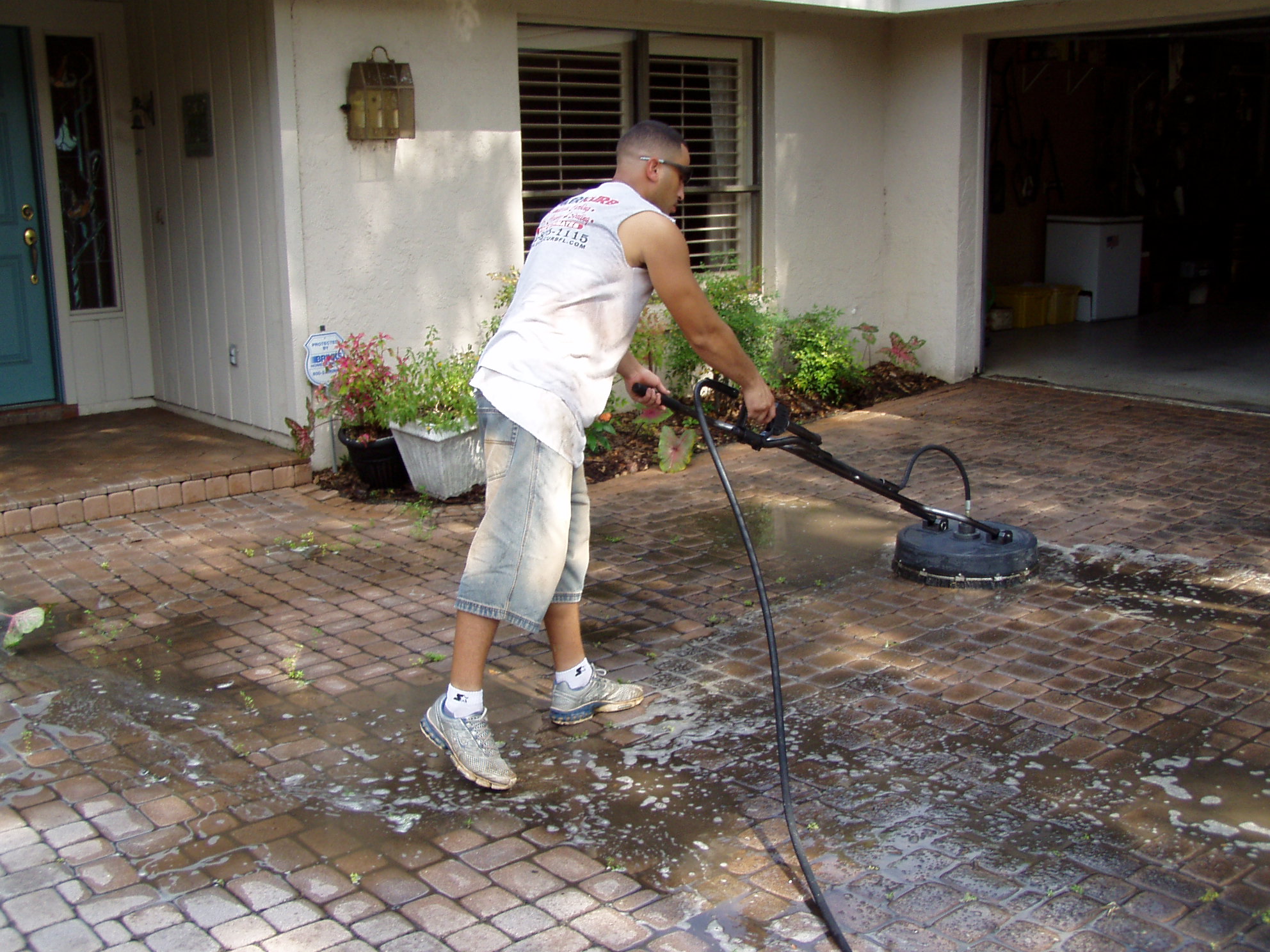Americurb has been proudly serving Central Florida, delivering quality service and unmatchable workmanship. Our customers can depend on quality services, delivered on time by experienced professionals.
There are several reasons you should seal your pavers, the least of these are the aesthetic results of the product. Acrylic sealers intensify the subtle colors and provide a glossy sheen to even the most haggard of paved surfaces.
The functional reasons for sealing your pavers are as follows:
- Protects the paver from stain penetration
- Helps prevent insect intrusion
- Resists mildew
- Inhibits weed growth
- Helps prevent tire marking
- Stops harmful UV rays
- Gives Paves a clean finished look without making the surface slippery
- Sealing your Pavers is highly recommended to keep them looking new & to protect them for years to come
Step1 Step 2
 
FAQ'S
What does sealing do for pavers?
Sealing is meant to protect pavers from the elements (i.e. rain, sun etc...) and anything foreign that were to fall on them. It creates an invisible barrier on top of the pavers that repels water, oil and anything else you might accidentally drop on your driveway or pool deck. Sealing also preserves the pavers' natural beauty for years to come. Sealing helps prevent insects and weeds, but is not guaranteed to eliminate them.
How long does the process take?
It's usually a 2-day process (weather permitting of course). The first day, we treat any stains with various solutions or solvents which is followed up by pressure cleaning, getting almost anything out (stubborn penetrating stains like oil and rust may not come out). The second day, given that the surface to be sealed is completely dry, our sealer is then rolled on.
We suggest vehicles not to be driven over a completed job for 48-72 hours. Pedestrians may walk on the sealed surface 2-4 hours after completion.
When do my pavers need re-sanding?
Fine sand is the finishing touch of any paver job. It gets into the little spaces between the pavers and secures them, preventing them from moving or shifting. Most people think that the sand needs to come all the way to the surface. Sand is securing the pavers together and does not need to be seen to do its job. If spaces are unusually large between the pavers, they might be shifting due to damage to your edge restraints and you might be in need of some repairs.
Will sealing my pavers make then shine?
Sealing is made to protect the pavers and also to preserve their beauty. When a sealer is applied, it darkens the original colors. Sometimes you might get the pavers to really shine, but it depends on your pavers' colors. Darker colors tend to have a more noticeable sheen then lighter ones. We use a high solids sealer which usually leaves a satin finish. Again this is a bonus that comes with sealing and not its main purpose.
How can you tell if you need to reseal your pavers?
A simple test can help you tell if you need sealing or not, but it's not the only one. Turn on your water hose and watch water bead up on the surface. If water is not beading, you might need a fresh coat of sealer.
How often do I need to reseal my pavers?
The first time your pavers are sealed it will last about one to two years depending on the care given to the area, the traffic, and the elements (i.e. rain, sun etc...). You can expect longer life of the sealer with multiple applications. In addition, the quality of the pavers and the condition of the pavers play a role in the longevity.
I had my pavers sealed before but there's a white cloudy film on the surface, can it be fixed?
There are two reasons cause a white cloudy film to appear on your pavers:
1. The number one reason is due to a cheap product being used. If too much cheap sealer is applied, the paver becomes saturated with the product and becomes white. Don't let anyone use a cheap sealer on your pavers! We would recommend leaving your pavers bare rather than coating them with a cheap sealer.
2. The number two reason is saturation with a good product. If after pressure cleaning, the job is not given time enough to dry completely, the sealer then traps moisture inside the paver. When that moisture tries to escape it is blocked by the sealer and causes that white look you notice. In most cases, we can apply a solvent which re-wets the sealer and allows this moisture vapor to escape.
What am I to expect when you come to pressure clean and seal my pavers?
The pressure cleaning and sealing process takes two days. All work will be completed weather permitting. If we are to do work around a pool, great care will be taken in keeping your pool clean, but even though we are careful your pool will be subject to debris (i.e. sand, dirt, etc...) from pressure cleaning. We suggest scheduling your pool company to inspect your filters and clean your pool after we complete the job. In addition, some covered pools have taken 2-7 days to dry from pressure washing before the sealer could be applied. We will contact you on date work is to be performed but cannot give you a specific time of start due to different variable. Please feel free to contact us for any other questions or concerns you may have.
|
| |
|


